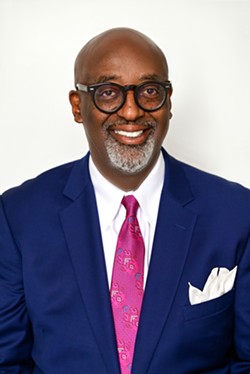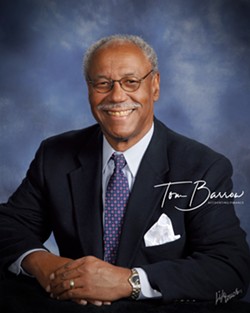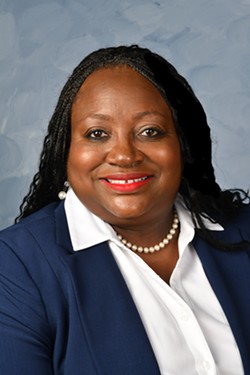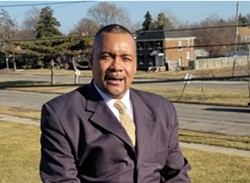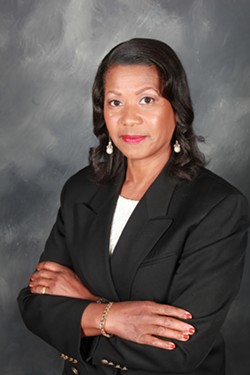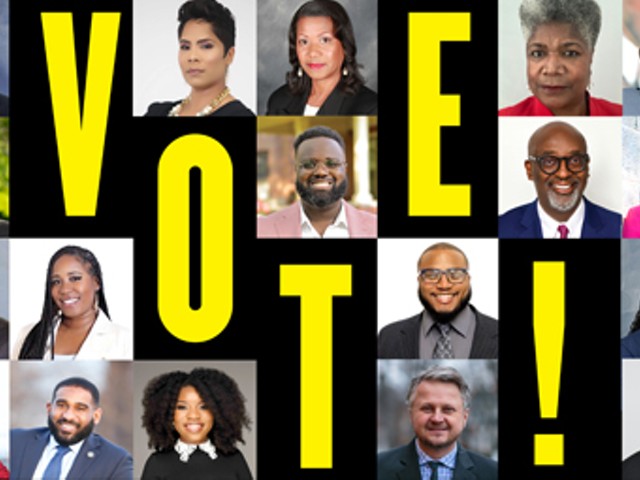Detroit’s primary election is Tuesday, Aug. 3, but you might not know it. In the mayor’s race, it hardly seems like the mighty Mayor Mike Duggan is even campaigning. But he doesn’t have to — he’s expected to handily win re-election for his third term. In fact, his campaign did not respond to numerous requests to answer a brief questionnaire that Metro Times sent to all the candidates in the Mayoral, City Clerk, and City Council races. While many inside and outside of Detroit credit Duggan for Detroit’s “turnaround” from “Murder City” to “Comeback City” over the past eight years or so, with the development downtown and the construction of Michigan’s tallest skyscraper at the former Hudson’s site serving as a visual representation, his critics say that the turnaround has not reached Detroiters living in the city’s other neighborhoods. Here’s what they told us.
Anthony Adams
Anthony Adams is an attorney with extensive experience in Detroit city politics, including serving as Deputy Mayor in the Kwame Kilpatrick administration. He also served as general counsel for Detroit Public Schools, executive assistant to former Mayor Coleman A. Young, and a federal judicial law clerk to U.S. District Judge Anna Diggs Taylor of the Eastern District of Michigan.
Of Detroit's "turnaround," Adams says, "The question presupposes that the turnaround has been complete, even, and equitable," he tells Metro Times. "It has not been. If you are new to Detroit and want to move into a neighborhood, purchase and develop a Land Bank property, there are special pots of money that are made available to you to redevelop your property. Unfortunately, existing residents are often left out of special financing programs, unable to obtain mortgages or home improvement loans, and generally unable to keep their property up." He adds, "With more residents renting rather than owning their home, we are creating a class of residents who control nothing of the economic resources impacting their lives."
If elected mayor, Adams says he would prioritize stabilizing existing residents in their homes by stopping property tax foreclosure, adjusting tax assessments to reduce disproportionate taxation of homes at lower values, and upgrade infrastructure in the city by creating more green conservation districts to divert stormwater runoff from neighborhoods. He would also support existing local businesses in the city by "using tools that support billionaire development for local small- and medium-sized businesses," he says.
Tom Joe Barrow
Tom Barrow is perhaps as Detroit as they come. He's the nephew of legendary heavyweight boxing champion Joe Louis, who he took his middle name from. "[Most] importantly, I have Uncle Joe's DNA and am also a fighter," he says. After Mayor Albert Cobo razed the Black Bottom neighborhood, Barrow's family moved to the city's east side, where he continues to live. After graduating from Wayne State University's School of Business with a major in accounting and an MBA with a concentration in finance, barrow became a certified public accountant in 1973 and began a career with the international firm of Arthur Andersen & Co, CPAs. For more than 40 years, he has been self-employed as a financial consultant. He also landed in federal prison for more than a year in the '90s for tax evasion and fraud. This is his fifth run for Mayor of Detroit.
Of Detroit's "turnaround," Barrow doesn't mince words. "This alleged 'turnaround' has created two Detroits," he says, "One downtown and the other in its neighborhoods. One is loved, and the other is neglected. In fact, Detroit's bankruptcy was a contrivance ... it was phony, fake, and unwarranted. As someone appointed by the U.S. Bankruptcy Courts as a Trustee, I know a phony bankruptcy when I see it, and Detroit's was phony. It and PA 436 (the Emergency Law) were conceived by conservatives to marginalize and take the wealth of every Black and Brown city in Michigan, and [they have] done so without exception." He adds, "Our city's next leader must bring about bold and progressive changes and think outside of the box for this amazing city. ... Detroiters who 'held it down' deserve to have their moral and financial investments recognized."
If elected, Barrow says he will immediately meet with the city's CFO to gain an understanding of the city's finances. "My governing priorities will be rooted in policies for residents to create the change Detroiters are demanding," he says. "I will immediately close the corrupt Land Bank Authority, seek to void the lifelong leases, and take both our Belle Isle Park and Water Department and many of our city assets back."
Barrow calls the city's wrongful $600 million over-assessment of Detroiters' homes and those who lost their homes as a result of that "the greatest theft of Black intergenerational wealth since that of Tulsa, Oklahoma, in 1921." He believes the overassement was criminal and "an abuse sanctioned by city government and was done knowingly and intentionally to increase the debt limit so as to justify the issuance of improper bond debt. But most importantly, it thwarted lifelong Detroiters from passing on their generational wealth to their children and grandchildren as other communities do."
Barrow says he would also immediately issue a moratorium on county tax auctions, provide future tax credits to affected homeowners, and fairly compensate those homeowners who lost their homes. He also believes in restoring pensions and health care to the city's retirees, which were cut in the bankruptcy, and calls for taking control of the city's water department, currently under the regional Great Lakes Water Authority, and create an affordability plan to avoid the painful water-shutoffs over delinquent bills that the city has seen in recent years.
Barrow also supports re-imagining policing for the 21st century by creating social-service units within the police department, and putting DPD under civilian control. He calls Detroit's demolition program "a disaster" that must be "radically overhauled to eliminate corruption," pointing to the program increasing its own costs and its failures to hire Detroiters. "But even more fundamentally, I believe that all so-called 'blighted' homes do not require demolition," he says. "Rather, I will offer these homes to nearby Detroiters who can demonstrate that they can fix and repair them and make them livable. I will accomplish demolition with participation from neighborhood stakeholders with a mandate to preserve libraries, schools, and rehab-able houses."
Barrow also imagines using federal funds to create opportunities for Detroiters by converting shuttered neighborhood school buildings and libraries into computer centers for seniors and neighborhood youth who cannot access the web at home, build seven public swimming pools in the city, and modernize the Coleman Young Municipal Airport. He also calls for an overhaul of Detroit's public transportation system. "I will make it ... easy for residents to get to suburban locations where the jobs are and encourage the use of clean public transportation as part of the city's greening," he says.
Kiawana Brown
Kiawana Brown is a native Detroiter who, along with her husband, are overseers of Transforming Lives Ministries of Detroit, whose Transforming Lives Community Training Center provides education, summer camps, feeding programs, and more. She's also the founder of Such a Lady, a mentoring program for at-risk girls and women ages 12-18.
Of Detroit's "turnaround," Brown says, "Surprisingly, after declaring such a massive bankruptcy, Detroit has taken some major strides in bouncing back," she tells Metro Times. "We have become a main attraction for investors and new development, which is good for our economy; but the emphasis has been primarily on downtown and the surrounding areas. Although downtown is a great area to invest in, I'd like to see funds spread throughout our neighborhoods. Detroiters have suffered trauma due to divestment of neighborhoods. Now, it's time to focus on building strong, viable communities throughout our city in order to see a true 'turnaround.'"
If elected, Brown says her priorities are lowering the city's crime rate, and promoting safer streets, community revitalization, education reform, criminal justice reform, environmental justice, social justice, and recreation and parks. "Although all of the aforementioned issues are important to me, I'd like to pinpoint one specifically — community revitalization," she says. "I believe the strength of our city lies within the development of strong communities. Many of our communities are void of necessities and lack the resources needed to build and uphold sustainable living. Neighborhoods have been stripped of schools, recreation centers, parks, libraries, grocery stores, etc., some have even lost banks and police departments. We must build the communities where Detroiters live, work, and play in order to establish a STRONG Detroit."
Myya Jones
In 2017, Myya Jones was a 22-year-old MSU student when she announced her bid to run against Detroit Mayor Mike Duggan. Though she collected enough signatures to be on the ballot, her longshot campaign hit a bump when she was deemed ineligible due the residency requirement and her changing her address when she was away at school This year, Jones is giving it another shot. And like last time, Jones says her goal is a campaign of hope.
It should be noted that Duggan was also forced to run as a write-in during his first successful mayoral campaign due to the residency requirement. But it's ironic, because, as Jones tells Metro Times, "I literally lived in every single part of Detroit."
"My childhood friends will tell you I grew up on the east side at Seven Mile and Van Dyke, and some of my other friends will say I grew up on the numbered streets on the west side, and some will say Myya grew up on Warren and Greenfield near Dearborn," she says with a laugh. "I literally lived everywhere because we were poor. We moved because we were always getting evicted, apparently. My mom would be mad [that] I said that, but it's the truth. Like I always tell her, 'Mom, you have to tell your story because our story is not unique. Our story is literally the story of so many Detroiters who live in a city.'"
One of 11 siblings in a single-parent home, Jones went on to graduate from Cass Technical High School, and from MSU in 2017. Since then, she served a stint on Capitol Hill as an intern for U.S. Rep. Brenda Lawrence, and also worked with General Motors. She is now a digital strategy lead at Google.
Jones says her experience in the corporate world has made her realize how important it is to get more Black people in these spaces due to the systemic racism and microaggressions she experienced there. "I'm a rebel," she says. "I go against the grain. I'm the person who wore my hair natural and the person who wore braids. I wore a lot of 'Black' hairstyles because this was the hairstyle that worked for me — and that's what I did. I made sure that I was truly who I was when I was in the internship."
Jones says the city needs to focus on creating jobs and opportunities for Detroiters. "The majority of the people who work downtown are not Black, and that's where all the corporate jobs are," she says. "Why hasn't it been that we are preparing young students who are in Detroit to have jobs at these corporate companies in downtown Detroit?"
Jones believes the city's poor education of its youth is tied to crime. "A lot of people don't commit crimes because they want to commit crime," she says. "People are literally trying to survive. We have to attack crime [by] addressing poverty."
Jones says she hopes that by running she can empower more young Black Detroiters. "I'm one person," she says. "I can't change the whole city. No one person can change the whole city. But what you can do is empower people and inspire ... people are looking for someone to take that step to be brave and have courage to do what they want to do, but they just don't have the strength and courage to do it themselves. And once that one person does it, it's going to activate a lot of people."
Jasahn M. Larsosa
Jasahn Larsosa is a community organizer, social justice advocate, and nonprofit executive who currently serves as founding director of advocacy, equity, and community empowerment for the civil rights and human services organization Focus: HOPE.
"As a community organizer, I have connected thousands of stakeholders and mobilized thousands to advance community agendas," he says.
This election is a bit of a family affair for Larsosa; his wife, Krystal, is also running for City Council District 1. The two have three daughters between the ages of 5 and 15 who Larsosa calls "brilliant" and "public influencers in their own right," with a combined 300,000 followers on Instagram, which they use "to celebrate the brilliance and the beauty of Black people and Black girls in particular," he says.
Larsosa is open about the fact that he spent more than a decade behind bars for cocaine charges, which he says helps inform him of the ways that bad policy impacts communities. "I recognize that my life has been quite fortunate, and I benefited from some exceptional circumstances and relationships," he says. "That should actually not be the exception, but the rule. And so my intention is to ensure that every young person, every family, has access to the exceptional opportunities that were afforded to me."
On Detroit's "turnaround," Larsosa says, "We're in a segregated city, and Black people, brown people, disabled people, and others are locked out of economic opportunity. ... And on the other side of the coin, there are opportunities that have been opened up, by and large, to people from outside of the city. And those opportunities are being afforded by those of us who live here."
Of Duggan, Larsosa says, "There's a narrative that we needed an ally. ... But he's not from the city of Detroit. He's a white guy from Livonia. And there was a mistaken notion that we needed an ally to lead us, but I'm not of that belief. And I don't think that it's the message we should be sending to our children." He adds, "People believe — not only outside Detroit, but those of us who live in Detroit — that the good things are happening because of that, when in fact, you know, their empire is being built based on subsidies that those who live here aren't awarded."
Larsosa points out that while Quicken Loans has more than 15,000 people working in Detroit, fewer than 5,000 are from the city. "That means that we're creating wealth for a number of folks who are outside of the city," he says. "The contracts that are awarded, [fewer] than 5% of those are awarded to Detroiters, and even those are suspect because we've got a lot of fraud where, you know, they choose an address, and there's a number of businesses that are registered there, and none of them operate here."
If elected, Larsosa says he would focus on improving the neighborhoods. "This agenda needs to be resident-driven and equity-informed," he says. "And I'm of the belief that the surest way to make that happen is to introduce leadership that understands the neighborhoods, so I offered myself up. ... But I'm also [running] to elevate voices and to enlist in the political process those who are typically ignored or pressed by it."
He adds, "Black people and brown people, especially young people here in the city of Detroit, deserve to be inspired. We deserve to see ourselves represented in positions of power, and to recognize ourselves as the agents of change and contribution that we are. And I believe that my involvement in the race, as someone who is well-known in the community, will do that. ... We have to build some momentum, and a nationwide movement of people with lived experience. ... If I win and come out the mayor, I expect that in four years from now, there's going to be some unlikely candidates stepping forward to offer what they know."
He adds, "As the largest majority Black city in the nation, we have a huge opportunity to set the example for the rest of the country [on] what it means to be an equitable city. .... And, you know, we're the city that put the country on wheels. We created an African American middle class, and because we're in a world that has evolved from manufacturing at the center of the economy, we have an opportunity to demonstrate not only for other states, but for the rest of the world — what's next? We do that through our brilliance. And we do that through our resilience and our creativity. ... After the murders of Breanna Taylor and George Floyd, people of color and our allies are looking for places that we can call home. And I think that Detroit could be one such place. We can be home to Black and brown Americans, we can be the Wakanda that we all saw in Black Panther."
Larsosa believes in building intergenerational wealth in Detroit by promoting homeownership. "But we're not talking enough about homeownership anymore in Detroit, which used to be a homeownership city," he says. He calls for facilitating the mass purchase of building materials to offset the rising costs by making them available to the public at a lower rate, and training people who live in the neighborhoods to rehab homes. This would "create a hyperlocal revenue stream, right in the neighborhoods," he says. "People will feel a sense of a very warranted community."
Charleta McInnis
A native Detroiter, Charleta McInnis has been a budget manager for Detroit's Office of Budget Department for more than 18 years. She also spent time as a Second Deputy Fire Commissioner under former Mayor Dave Bing
On Detroit's "turnaround," McInnis says, "I think Detroit is doing a wonderful job downtown, and I want to continue the momentum. I want the same turnaround in the neighborhoods. I want Detroit to become solution-oriented and change the culture. I want the citizens of Detroit to become accountable, empowered, and self-reliant. I want Detroit unified, by bringing all areas of Detroit together so we all can rise together."
If elected mayor, McInnis says her priorities would be to reduce poverty and increase high school graduation rates, as well as giving Detroit residents the first opportunity to purchase the vacant homes owned by the city and Land Bank, and make the residents whole that were overcharged in property taxes, by reducing the citizens' property taxes over the next five years. For those who lost their homes, McInnis calls for giving them the opportunity to purchase a home from the Land Bank for half the price. She also believes that Detroit has a mental-health crisis, and calls for opening mental-health centers and recreation centers in the city, as well as extending the hours of recreation centers to keep children off the street and support working families. She also wants to restore the summer youth jobs program to clean up the parks, school grounds, and neighborhoods.
She also calls for a reduction of Black-on-Black crime and encourages citizens to report crimes. "We as citizens of Detroit must start taking pride in our city and start capturing people throwing trash out of the cars or on the street and start reporting these individuals," she says.
DaNetta L. Simpson
DaNetta L. Simpson did not wish to participate in our questionnaire. "Y'all gonna endorse Duggan, so I don't see why you're asking other candidates," she says when reached by phone.
Art Tyus
A Chicago native, Art Tyus moved to Detroit in 1983 and has been here ever since, where he has worked in Information Technology and owned a bar called the Empire Lounge, which he says was hit with high drainage fees once Duggan came into office. "My general tax was $2,500," he says. "But when he put the drainage fee on it, it became $7,000 a year."
Tyus calls the drainage fee "an attack on the residents," along with charging residents for back taxes on properties bought from the Wayne County auction. "I paid $500 for the building, but there were almost $20,000 in back taxes. ... it's a way to take back property and make us back to landless people again. ... it really was a terrorist attack — a bloodless terrorist attack — on the people of Detroit."
Unprompted, Tyus tells Metro Times that he believes the viruses that cause AIDS and COVID-19 are biological weapons deployed by white people against Black people, citing higher infection rates for both viruses in Detroit's Black community. At this point, Tyus launches into a rambling tirade about what he calls a "plandemic," which included a large number of false claims that frankly feel dangerous to publish here, including saying that he believes that the virus that causes COVID-19 travels through food, especially free food offered by government programs and churches during the pandemic, and not the air, which is not true. Because he believes the virus doesn't travel through the air, he won't wear a mask, and he says he will not get vaccinated because he also distrusts the vaccines. (Numerous studies show the vaccines are safe and effective in preventing COVID-19.) This is despite the fact that he says he got COVID-19 earlier this year.
As far as priorities go, Tyus calls for creating more opportunities for youths ages 12 to 18 and converting vacant schools into job-training centers where people can learn skills like carpentry, masonry, electrical, and plumbing. "We need massive training, massive education, we need massive housing," he says. "Housing is most important because if you don't know where you're going to live, you can't be stable. "I grew up not in American dream, but American nightmare," he says. "So I want to offer to people that someday they can aspire to become the best they can be."
D. Etta Wilcoxon
D. Etta Wilcoxon is the publisher and editor of the Renaissance Observer, a former city magistrate in Birmingham, Alabama, and a former professor at the University of Detroit, its law school, Alabama State University, and Wayne County Community College. She was also formerly the executive director of the Northend Community Development Corporation, and the government community affairs manager for 3M Corporation. She also successfully sued Detroit's 36th District Court to allow cell phones, computers, and writing instruments, and also sued the powerful Ilitch family for using tax dollars meant for Detroit's public schools to help finance its Little Caesars Arena. "The current administration was nowhere to be found in that fight," she says. "We fought it alone." (The suit was settled.)
On Detroit's "turnaround," Wilcoxon says, "I am glad that you put the phrase 'turnaround' in quotes, because Detroit has not experienced a turnaround in the last eight years, in my estimation." Wilcoxon says she has traveled across Detroit, talking to people as part of her campaign. "We are not hearing people in the neighborhoods say that Detroit has experienced a turnaround. A turnaround for the business community, yes. A turnaround for residential neighborhoods? Absolutely not. The city of Detroit has focused [its] attention ... on Midtown and downtown. Unfortunately, for the rest of us, we don't live in Midtown or downtown."
Wilcoxon says she believes repopulating the city should be the top priority. "If we can't regrow the population, which is what we have said over the last eight years would be the deciding factor in terms of whether or not there would be a turnaround in the city of Detroit, that is an abysmal failure," she says. "We have not increased the wealth of Detroiters. In fact, the wealth of Detroiters has gone down."
Education is also a priority for her. "I've taught from preschool to law school, and if you do not have a child able to read by third grade, you do not teach that child," she says. "In fact, we've built jail [cells] based on the predictions of the number of people who fail third grade reading. So it's critical for any mayor to understand that when an Amazon or anyone else wants to come into the city of Detroit, they want an educated workforce. We don't have one."
Wilcoxon also calls for eliminating Detroit's water drainage fees, which she says are prohibitive. "Detroiters are paying water drainage fees on a monthly basis," she says. "One of my team members happens to live in Oakland County, and she showed me her last water bill. She pays every three months ... and her last water bill was for [about] $30 — water, sewers, drainage fees, you name it. ... My water bill, on the other hand, went from [$50] when this administration came into place, and it has gone up to as high as almost $170 per month." She calls it a "tax," and believes it is illegal under the Headlee Amendment.
She also says she would put a halt to Detroit's demolition program. "Detroit has some of the most beautiful architecture in the world," she says. "This city is over 300 years old. They don't make what we have here anymore. You don't have the artisans, and you don't have the artwork that those artists created. ... When you knock a home down, and you leave a vacant lot, you replace one form of blight with another. The neighbors have vacant lots next door to them, overgrown grass, weeds, and all sorts of activity going on in those areas." She says she is not a proponent of "defunding the police," but calls for a return to community policing, where officers are from the communities they serve, are paid well, and held accountable.
She also says she's a firm believer in reparations. "There's a national conversation regarding reparations," she says. "Our sister states and cities are seriously not only considering, but addressing the evils of slavery. Detroit ought to be at the forefront of that."
Part of our Detroit 2021 primary guide.
Stay connected with Detroit Metro Times. Subscribe to our newsletters, and follow us on Google News, Apple News, Twitter, Facebook, Instagram, or Reddit.


